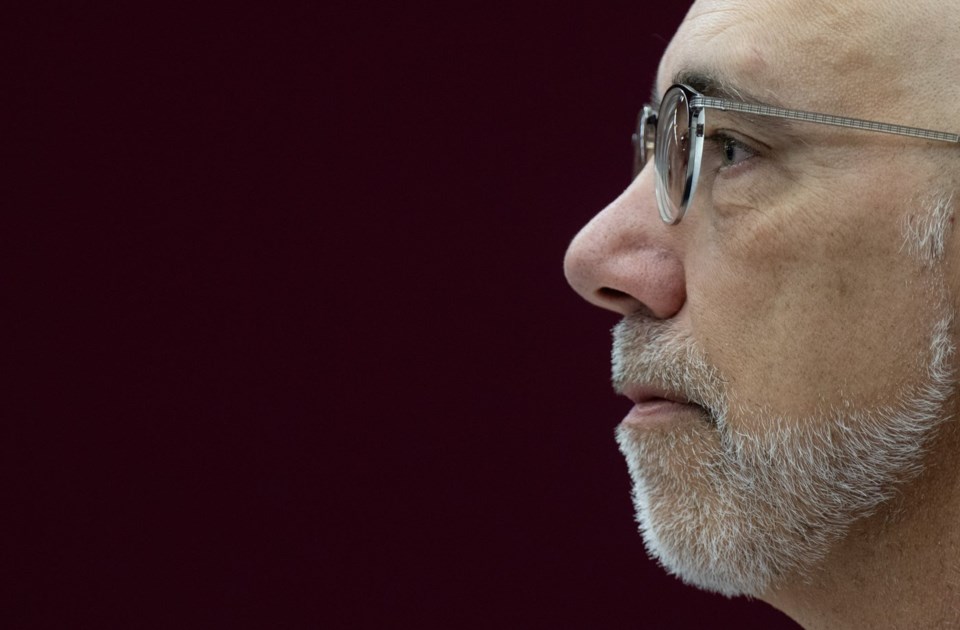OTTAWA — It's up to Canadians to decide whether they believe the government's proposal to create a new online harms regulator amounts to bureaucracy or a necessary enforcement tool, parliamentary budget officer Yves Giroux suggests.
Earlier this year, the government introduced a bill that aims to reduce exposure to harmful content online, including the sexual victimization of children, sharing intimate content without permission and content that promotes hatred, violence or extremism.
The proposed law, dubbed the Online Harms Act, would create a digital safety commission tasked with enforcement, an ombudsperson to aid Canadians, and a new administrative office to support both.
Canadian Heritage estimates that it will take more than 300 people to staff those entities, and last week Giroux issued a report suggesting that would come at a cost of around $201 million over five years.
Justice Minister Arif Virani says the law is needed to compel social-media companies to better protect Canadians, especially minors.
But Conservative Leader Pierre Poilievre has vowed to scrap the legislation, pointing to Giroux's cost estimate as proof the law is just creating more bureaucracy.
He has slammed the bill as a censorship attempt by Prime Minister Justin Trudeau's government, despite Virani and justice officials saying it would respect the Charter right to free speech.
"You can say it's more bureaucracy or … it's giving teeth to the legislation by ensuring there's an enforcement arm that's there to ensure the act is respected," Giroux said in an interview on Monday.
"But the fact is, according to the government, they'll need 330 employees. … You can say it's bureaucrats. You can say it's the necessary tools."
The bill was introduced in February, but debate had only just begun last month when the House of Commons rose for its summer break.
One of the experts the government consulted to craft the bill said putting a price tag on establishing a new regulator was always going to bring controversy.
"It's an unavoidable cost," Emily Laidlaw, a Canada Research Chair in cybersecurity law at the University of Calgary, said in an interview.
"We don't question the existence of the Competition Bureau or, you know, the (Canadian Radio-television and Telecommunications Commission). We know we need these and it's the same now for platform regulation and online harms."
Michelle Rempel Garner, the Conservative MP who asked Giroux to do the cost estimate, wrote in an online post last week that the cost of the new system is even more of an insult because of what she described as the under-funding of police to enforce existing laws.
The Conservatives have said they would dismantle the Liberal law if it passes, and instead ensure existing laws are enforced and updated to take into account that Canadians have digital lives and face realities such as online harassment.
Laidlaw said she agrees that tougher Criminal Code changes are needed, but said such reforms don't go far enough on their own.
"How do you actually regulate these gigantic … digital corporations that are having a massive impact on our society?" she said.
"Other jurisdictions are building out regulators because it's the only way to deal with these problems, and so Canada is really following suit."
As proposed, the bill would give the new regulator the power to fine companies that violate its rules. Those include a requirement that companies take down images of child sexual abuse or intimate images shared without consent within 24 hours.
Companies would also have to provide safety plans that outline the steps they are taking to reduce users' exposure to other material, like content that is related to terrorism or can be used to bully a child.
Giroux said the regulator could offset some of its costs through fines or by charging fees, but that didn't factor into his analysis because there is not enough detail on how it would work.
He said the department's figures suggest it would likely be at least two years before the enforcement bodies are up and running, but added the costs could be higher if a proposal to allow the Canadian Human Rights Commission to hear complaints is implemented.
"There could also be some legal costs if they were to prosecute or need legal advice to get into that relatively new area for them."
The Opposition Conservatives and civil-society advocates warn that reinstating the commission's ability to hear complaints related to online hate speech could lead to an influx of cases that would burden its workload and risk chilling free speech.
Justice officials say only the most extreme examples of speech would be likely to be probed.
This report by The Canadian Press was first published July 8, 2024.
Stephanie Taylor, The Canadian Press




